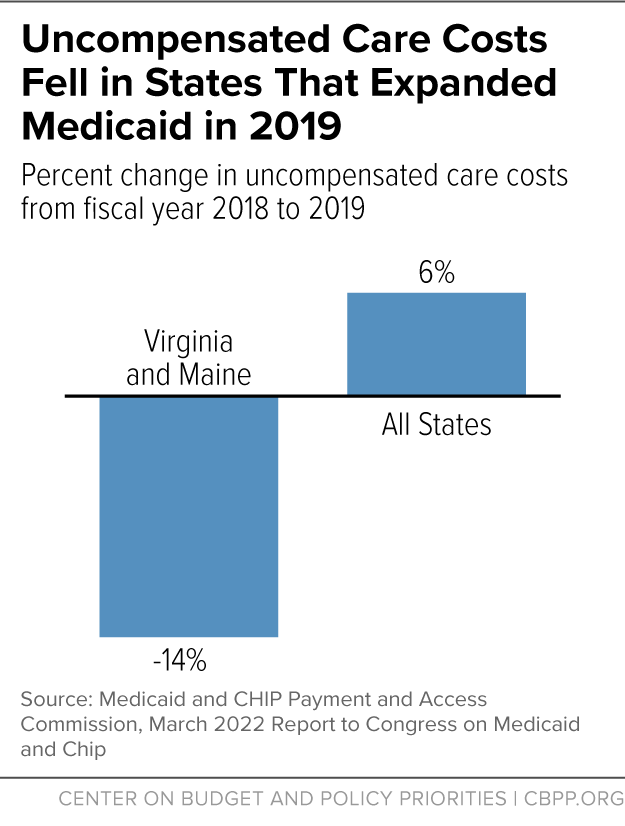BEYOND THE NUMBERS
A recent report from the Medicaid and CHIP Payment and Access Commission provides another reminder that states that expand Medicaid under the Affordable Care Act (ACA) see substantial reductions in uncompensated care costs — the cost of providing health care that goes unpaid by patients or insurers. The report underscores one of the benefits of expanding Medicaid in states that haven’t yet expanded but are considering doing so, such as South Dakota. South Dakotans will vote this November on a constitutional amendment to implement Medicaid expansion beginning July 1, 2023. If passed, South Dakota would join several other states that recently expanded Medicaid through voter-led initiatives.
Virginia and Maine, which expanded Medicaid in 2019, saw declines in uncompensated care costs of 14 and 13 percent in 2019, respectively, according to the report. In contrast, nationwide uncompensated care costs rose 6 percent (see chart), providing strong evidence that the large decline was a result of implementing the Medicaid expansion. The reductions in Virginia’s and Maine’s costs were the largest among all states in percentage terms (excluding Oregon and Hawai’i, whose declines were due to large amounts of missing data).
This benefit of Medicaid expansion is not surprising. Uncompensated care costs mostly consist of charity care and debt expenses for uninsured people, and when Medicaid expansion provides coverage to more previously uninsured people, these costs decline. In Virginia, this relationship was particularly apparent: the number of non-elderly people without coverage fell by over 7 percent in 2019, while Medicaid enrollment rose by 350,000 (an increase of roughly 38 percent); both changes were the largest among all states.
This echoes what happened in other states that expanded Medicaid as the major ACA coverage provisions took effect. Hospitals’ uncompensated care costs fell by $8.6 billion (23 percent) from 2013 to 2015, with states that expanded Medicaid seeing declines several times larger than those that did not. In 2019, uncompensated care costs in expansion states were less than half of those in non-expansion states as a percent of hospital operating expenses. A large body of research has demonstrated that Medicaid expansion reduces hospitals’ uncompensated costs.
The evidence is clear that providing health insurance to people with low incomes — whether through Medicaid expansion or by closing the Medicaid coverage gap — leads to declines in uncompensated care costs as well as improvements in coverage, access to care, health outcomes, and financial well-being.

